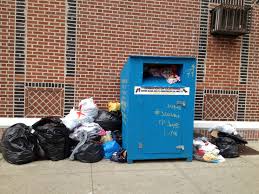by Nick Taylor
Controversy about for-profit companies that sell “donated” used clothing clouds the really important issue. Recycling clothing works on a number of important levels. First and foremost, it keeps millions of pounds of fabric out of landfills.
And then, of course, we satisfy our impulse to clean out a closet and maybe do some good by donating to a charity that can resell and make money and incidentally, we can claim a tax deduction.
We’ve all bundled up clothes we no longer wear and dropped them at the Salvation Army, the Housing Works AIDS charity in New York City, or in a Goodwill Industries donation bin.
What most of us don’t know is that very little of that clothing is sold to thrift shop customers. Housing Works, where I donate regularly, and other charities, sell only a small percentage of what they collect in their stores. They sell the rest by the pound to for-profit companies for recycling or shipment for resale overseas.
Lately, though, those companies have been cutting out the middle man.
 Companies like Viltex, a for-profit recycler based in Newark, NJ, puts its own bins out on city streets.
Companies like Viltex, a for-profit recycler based in Newark, NJ, puts its own bins out on city streets.
Here’s the problem, or problems.
In some communities, the recyclers plunk down the collection boxes without regard to whether people can get by, or even want them in their neighborhood. Many community zoning laws don’t cover this kind of obstruction. When people complain, the boxes get moved down the street or to another neighborhood.
In New York it’s illegal to place collection bins on public sidewalks, city property, or private property without permission. The law went into effect because theses boxes become obstructions and eyesores that overflow and attract trash and graffiti.
The bigger problem, though, is that the for-profit bins still give off that charity vibe with vaguely generous slogans written on the sides. There’s nothing to say they’re part of a profit-making operation. It’s a good bet that most clothing donors think they’re donating to the less fortunate instead of a company’s bottom line.
Deception aside, however, recycling clothing in whatever form is a good idea.
New York City has collected half a billion tons of recyclables so far in 2014 but there’s a lot to recycle beyond bottles, cans and paper and clothing is the next frontier.
Re-fashioNYC, a clothing and textile recycling initiative, puts recycling bins into office and large apartment buildings and sends donations to Housing Works where they are sold to the public or recyclers. So far this year the program has collected 823,000 pounds of clothing.
And we city dwellers know that if you leave anything that’s even vaguely re-useable along with your garbage on the sidewalk, it’s likely to be scarfed up in minutes. Now, the NYC Stuff Exchange lets you go online to find locations citywide to donate, sell or buy used clothing.
And on Friday, August 15, ReuseNYC Thrift Store Day will encourage second lives for used clothing with discounts at thrift stores throughout New York.



